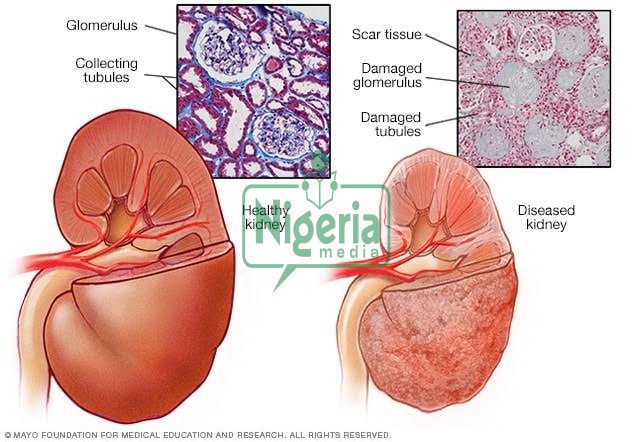 Chronic Kidney Disease (CKD) is a long-term condition in which the kidneys gradually lose their function. Because the kidneys are responsible for filtering waste, balancing electrolytes, and managing fluids in the body, managing your diet becomes crucial when dealing with CKD. The right food choices can help reduce the workload on your kidneys and slow the progression of the disease.
Chronic Kidney Disease (CKD) is a long-term condition in which the kidneys gradually lose their function. Because the kidneys are responsible for filtering waste, balancing electrolytes, and managing fluids in the body, managing your diet becomes crucial when dealing with CKD. The right food choices can help reduce the workload on your kidneys and slow the progression of the disease.
In this article, we’ll explore the best foods to eat when you have chronic kidney disease, and why these foods can support your health and kidney function…CONTINUE FULL READING>>>>>
1. Leafy Greens (in moderation)
Examples: Kale, Spinach (limited), Cabbage, Lettuce
Tip: Choose low-potassium greens like cabbage and lettuce for safer daily use. Always monitor your potassium levels with your healthcare provider.
2. Berries
Examples: Blueberries, Strawberries, Raspberries, Cranberries
Berries are packed with antioxidants, fiber, and vitamin C. They help reduce inflammation and oxidative stress, which is beneficial for kidney health.
Why they’re good: Low in sodium and potassium, but high in flavor and nutrients.
3. Apples
Apples are kidney-friendly fruits rich in fiber and anti-inflammatory compounds. They help reduce cholesterol, regulate blood sugar, and support digestion — all important for those with CKD.
How to eat: Fresh, baked, or as unsweetened applesauce.
4. Red Bell Peppers
Red bell peppers are low in potassium but rich in vitamins A, C, B6, and folic acid. They are also full of lycopene, an antioxidant that helps fight kidney-damaging free radicals.
Great in: Salads, stir-fries, or roasted as a snack.
5. Garlic
Garlic not only adds flavor to food without extra salt, but it also has anti-inflammatory and cholesterol-lowering properties.
Why it matters: It helps manage blood pressure — an important factor in kidney disease.
6. Cauliflower
Cauliflower is a versatile vegetable high in vitamin C and fiber. It also contains compounds that help the liver neutralize toxins — supporting your body’s detox process when your kidneys are compromised.
Tip: Steam, mash, or roast it for different textures.
7. Egg Whites
Egg whites provide high-quality, kidney-safe protein without the phosphorus found in egg yolks. Protein is necessary for the body, but too much — especially low-quality protein — can burden the kidneys.
Ideal for: Breakfasts, scrambles, or low-fat omelets.
8. Olive Oil
Olive oil is a healthy fat that supports heart and kidney health. It contains anti-inflammatory compounds and is phosphorus-free, making it a smart choice for cooking and salad dressings.
9. White Rice and Pasta (in moderation)
Low-potassium, low-phosphorus carbohydrate sources like white rice and pasta can be good choices when your kidneys can’t filter excess minerals effectively. Choose whole grains only if your phosphorus levels are within a safe range.
10. Pineapple
Unlike bananas or oranges, pineapple is a tropical fruit that’s lower in potassium and can safely satisfy a sweet tooth for people with CKD. It also contains bromelain, an enzyme with anti-inflammatory benefits.
Bonus: What to Limit or Avoid
Even with healthy foods, it’s just as important to know what to reduce or avoid:
- Salt (Sodium): Can raise blood pressure and damage the kidneys
- Phosphorus-rich foods: Like organ meats, dairy, dark sodas
- Potassium-heavy foods: Bananas, avocados, tomatoes (unless advised otherwise)
- Excess protein: Especially red meats, which can burden weakened kidneys
Final Thoughts
Managing chronic kidney disease doesn’t mean you have to give up delicious food — it just means making smarter choices that support your body’s needs. The right diet can improve how you feel, slow down the progression of CKD, and reduce complications.
Always consult with a doctor or registered dietitian before making significant changes to your diet, especially when dealing with a condition as sensitive as chronic kidney disease….CONTINUE FULL READING>>>>>
